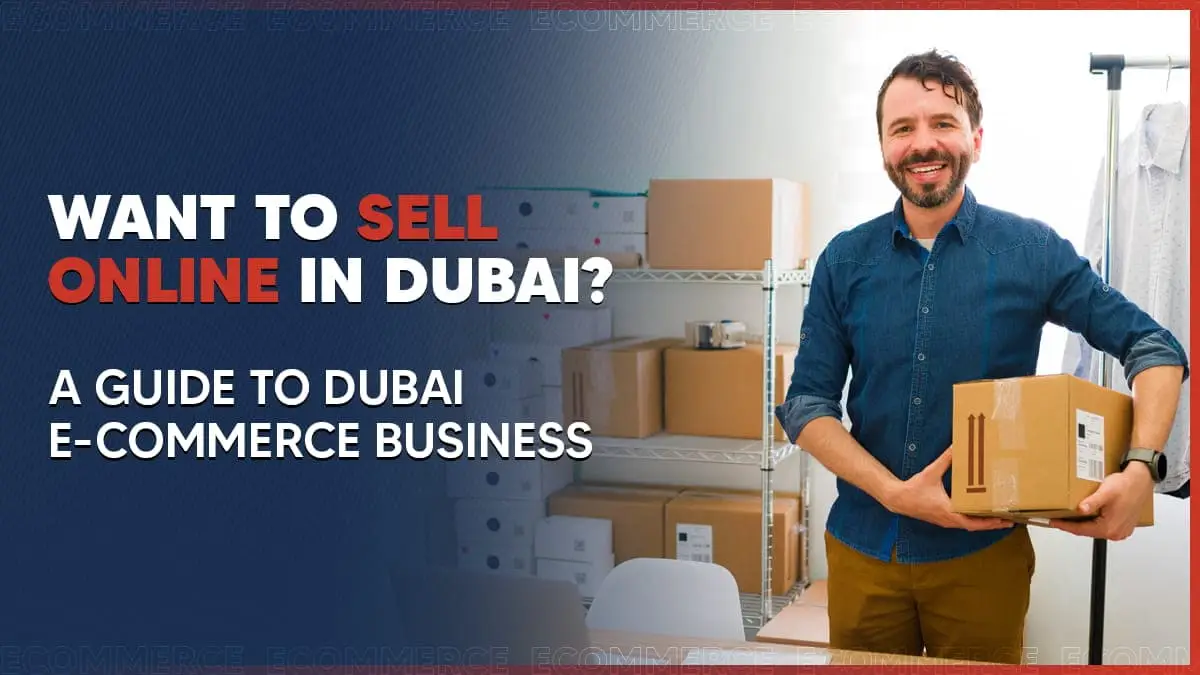Dubai has rapidly transformed itself into a global hub for business and innovation, and the eCommerce business in Dubai is no exception. With the rise of online shopping and digital transactions, the e-commerce landscape in Dubai has been growing rapidly. In fact, the UAE e-commerce market is expected to reach $17 billion by 2025.
Starting an eCommerce business in Dubai comes with plenty of benefits. From the ease of doing business in a tax-free environment to the strategic location that provides access to markets in the Middle East and beyond. Additionally, the city’s reputation for luxury and innovation creates a unique market for eCommerce businesses to thrive.
If you’re one of those entrepreneurs considering starting an E-commerce business in Dubai, you’ve come to the right place. Here we will explain everything on how to start an eCommerce business in Dubai, UAE. We will also help you understand costs, licensing, benefits, legal considerations and much more.
Why Start an E-commerce Business in Dubai?
Starting an e-commerce business in Dubai offers numerous benefits and opportunities, such as:
1. Booming E-commerce Market
Dubai boasts a large and growing online consumer base which makes it an ideal market for e-commerce businesses.
2. Business-Friendly Environment
The UAE government has implemented policies to support e-commerce, including streamlined regulations and infrastructure development.
3. Custom Duties
Depending on the free zone, you might enjoy exemptions from import/export duties, reducing operational costs.
4. Zero Income Tax
Dubai offers a tax-free corporate and personal income environment which allows businesses to retain more profits.
5. Tech-Savvy Population
A large segment of the population is digitally inclined and comfortable with online transactions.
6. World-Class Infrastructure
Advanced logistics, telecommunications, and payment systems support efficient e-commerce operations.
How to Start an E-commerce Business in Dubai, UAE
Starting an e-commerce business in Dubai can be an exciting venture. Here’s a step-by-step guide to help you get started:
1. Market Research and Business Planning
Identify your target market and niche within the Dubai e-commerce landscape. Conduct thorough market research to understand consumer behaviour, preferences, and competitors.
2. Choose a Business Location
One of the first crucial decisions when starting an e-commerce business in Dubai is determining whether to set up a mainland or free zone company. Each option has its own set of advantages and disadvantages.
Mainland Company:
- Operated within the UAE mainland.
- Full business ownership for most business activities.
- Allows operations within the UAE and internationally.
- Higher setup costs and operational expenses.
- More flexibility in business activities.
Free Zone Company:
- Operated within a designated free zone area.
- Allows 100% foreign ownership.
- Typically offers tax benefits and customs exemptions.
- Lower setup costs but ongoing fees.
- May have restrictions on trading within the UAE mainland.
For most starting e-commerce businesses, a free zone company is often the preferred choice. This is because it offers 100% foreign ownership, simpler setup procedures, and a tax-friendly environment. However, the specific choice depends on factors such as your business model, target market, and long-term goals.
3. Choose a Business Structure
Decide on the legal structure for your business (LLC, Free Zone company, etc.) based on your business needs, ownership, and tax implications. Consider factors like liability, ownership, and tax benefits when making your decision.
4. Business Name Registration
Choose a business name that complies with UAE naming conventions and get it approved by the Department of Economic Development (DED) or relevant free zone authority.
5. Business Licensing and Registration
Apply for an e-commerce license in Dubai. If in a free zone, submit the application to the respective authority. If in the mainland, apply through the DED. Prepare and submit necessary documents, including passport copies, visa copies, No Objection Certificate (NOC) (if applicable), and a completed application form. Comply with any additional permits or certifications needed for your specific product or service.
6. Lease Agreement
Secure a physical office or warehouse (if needed) space and obtain a tenancy contract (Ejari) if required.
7. Corporate Bank Account
Open a corporate bank account in Dubai. Provide necessary documents such as your trade license and passport copies of shareholders.
8. Set Up Your Online Store
Choose an e-commerce platform (Shopify, Magento, WooCommerce, etc.) that aligns with your business needs and budget. Design a user-friendly and visually appealing online store. Optimize your website for search engines (SEO) to improve visibility.
9. Logistics and Fulfillment
Choose a suitable fulfilment and shipping partner to handle order processing, packaging, and delivery. Explore options like in-house fulfilment or outsourcing to third-party logistics providers.
10. Payment and Financial Management
Set up secure payment gateways to accept online payments (Visa, Mastercard, Apple Pay, etc.). Consider using accounting software to streamline financial operations.
11. Legal and Regulatory Compliance
Adhere to Dubai’s e-commerce regulations and consumer protection laws. Ensure compliance with data privacy regulations (GDPR, UAE Data Protection Law). If your annual turnover exceeds the mandatory threshold (currently AED 375,000), register for VAT with the Federal Tax Authority (FTA).
Considering the legalities and complexities involved, we highly recommend getting assistance from experts at Shuraa Business Setup. Our experts will assist you with all the paperwork and legalities to ensure smooth company formation in Dubai.
Requirements for Getting an E-commerce License in Dubai
The specific requirements for obtaining an e-commerce license in Dubai can vary depending on the type of license (mainland or free zone) and the nature of your business. However, here are few of the requirements:
- Passport copies of shareholders and managers
- Business plan outline
- Trade name reservation
- Visa and office space
- Local Sponsor (if required)
- E-trader License (most affordable option for small-scale e-commerce businesses)
How Much Does It Cost in Dubai to Start an E-Commerce Business?
There are different types of e-commerce licenses available in Dubai, each with its cost structure and associated costs
- E-trader License: This is the most affordable option, starting from AED 1,070. It’s suitable for small-scale e-commerce businesses with limited activities.
- Mainland Company License: Costs can range from AED 12,000 to AED 30,000 or more, depending on the business activities and location.
- Free Zone Company License: Typically starts from AED 5,750 but can vary depending on the free zone and the specific license package.
The cost of an e-commerce license in Dubai can vary significantly depending on several factors:
- Business Structure: Choosing between a mainland or free zone company will impact the overall cost.
- Business Activities: The specific products or services you offer can influence the license requirements and fees.
- Additional Fees: There might be additional fees for visa processing, office space, and other services.
- Business Size: Larger businesses may require additional licenses or permits, increasing costs.
- Location: Setting up in a prime location can lead to higher office rental costs.
To get an accurate estimate for your specific e-commerce business, it’s recommended to consult with our business setup consultant in Dubai. They can provide tailored advice based on your business requirements and help you choose the most cost-effective option.
Get Expert Advice at Every Step
Starting an e-commerce business in Dubai is a great opportunity for entrepreneurs worldwide. The city’s diverse and wealthy population, along with its focus on technology, makes it an ideal spot for e-commerce success. Setting up an e-commerce business in Dubai can seem complicated, but it doesn’t have to be. That’s where Shuraa Business Setup can help. We offer a range of services to make the process easier for you, including UAE company registration, licensing, documentation, PRO services, visa assistance, office space, and more.
When you partner with Shuraa Business Setup, you can focus on building your business while we handle the paperwork and regulations. Let us help you turn your e-commerce dream into reality in one of the world’s most exciting business hubs.
Ready to start your e-commerce journey in Dubai? Contact Shuraa Business Setup today at +971 44081900 or send a WhatsApp message at +971 50 777 5554 or mail your query to [email protected].
Frequently Asked Questions
1. Can an e-commerce business in the UAE be run fully remotely?
Yes, it’s possible to run an e-commerce business in the UAE fully remotely. Many free zone setups allow for remote management. However, regular visits might be required for certain legal and operational matters.
2. Can a business set up multiple stores online in the UAE using one trade license?
Yes, a single trade license can typically support multiple online stores under the same brand or umbrella. However, specific conditions might apply depending on the license type and free zone regulations.
3. Can I set up an e-commerce company in a free zone that sells its products in the UAE mainland?
Generally, no. Free zone companies are primarily restricted to operating within the free zone and engaging in export activities. Selling directly to consumers in the UAE mainland requires a mainland license. However, there might be exceptions or workarounds, so it’s crucial to consult with our business setup advisor.
4. Do companies need a physical office to run an e-commerce business in the UAE?
It depends. While some free zone setups allow for virtual offices, mainland companies usually require physical office space. The specific requirement depends on the chosen business structure and license type.
5. What are the essential permits and licenses required for an e-commerce business in Dubai?
The specific permits and licenses required depend on the business activities and chosen business structure. Generally, an e-commerce license, trade name registration, and potentially import/export licenses are essential. Consulting with a business setup advisor will provide accurate guidance.







